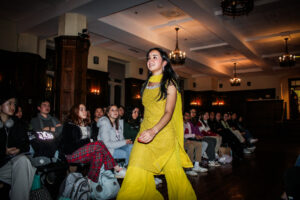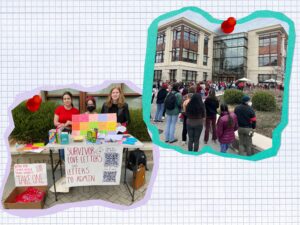Content warning: this article references violence against Asian American individuals and communities.
A graduate student at American University, 38-year-old Patrick Trebat, attacked Sean Lai (PHD ’20), a gay man of Chinese descent, and his family, in the Observatory Circle neighborhood this August. Students at both American and Georgetown only became widely aware of it weeks following the incident and took action to spread awareness of the hate crime.
Trebat yelled homophobic slurs at Lai and his family; shouted “Get out of my country” and other xenophobic remarks; and physically assaulted them, destroying Lai’s cell phone. The family was transported to the hospital after sustaining non-life threatening injuries: the father’s wrist and the son’s finger were broken. Trebat is now facing three counts of bias-related assault and property destruction, which have maximum sentences of 4 and a half years and 270 days, respectively.
This attack on the Lai family mirrors a rising trend in the number of hate crimes against Asian Americans. According to the FBI, hate crimes perpetrated against Asian people rose by 76 percent in 2020, and 20 percent of hate crimes committed in the same year targeted a person’s sexual orientation.
Sarah Tyree (COL ’24), co-chair of the Georgetown Asian American Student Association (AASA)’s Political Awareness Committee (PAC), said she initially heard about the incident from the AASA co-presidents, Keven Zhang (SFS ’23) and Emeline Ahn (COL ’23), who brought it to her and her co-chair’s attention about two months after the assault occurred.
Tyree was shocked that news about the attack took so long to reach Georgetown’s Asian American community. Lauryn Ping (COL ’23), the other PAC co-chair, said her initial reaction to the news was sadness, followed by infuriation and fear.
American University’s Asian American Student Union (AASU) released a statement on Oct. 8 condemning the university for their handling of the situation, alleging “attempts to sanitize and sweep this information under the rug to protect both a white supremacist and the university’s own reputation.”
They additionally opposed increased police presence on the campus as a reaction to the incident, affirmed their stance against white supremacy, and acknowledged the grief both Asian and LGBTQ+ communities may be feeling.
“Patrick Trebat is no longer affiliated with American University and is not allowed on campus,” the official American University Instagram account added as a comment under AASU’s statement. American issued no further clarification on the consequences Trebat will face from the university.
AASA released their own statement on Oct. 13, written by the PAC co-chairs. Ping says that she and Tyree were inspired by their flood of emotions, and were hoping to spread awareness about the attack and about anti-Asian violence.
The statement not only denounced the attacker’s actions, but also the way the case was handled by the U.S. Attorney’s office. Though the U.S. Attorney classified the attack as an anti-Asian bias-related assault, the charge did not include an anti-gay classification based on the homophobic remarks directed towards them. “I think that’s an egregious oversight because the motivations have to be explicitly addressed for there to be an adequate, all-encompassing response,” Tyree said.
The statement also highlighted the rise in anti-Asian hate crimes in the past year, referencing the murder of six Asian women by a white man in Atlanta in March. The co-chairs included a call for solidarity with the Asian community. “Anti-Asian violence at the hands of white supremacists will continue to transpire unless Asian Americans and their allies stand up and speak out,” the statement read.
Still, there is much work to be done and justice to be realized, according to Ping and Tyree. The AASA statement recognized that one statement cannot eradicate deeply embedded systems of oppression. Ping explained the deep impact that this oppression and marginalization has on Asian American individuals and their communities, and the ways in which the attack brought these feelings to the surface.
“It served as a reminder that I, and all of my Asian peers, have never been safe in this country. No matter how hard we work or how much of ourselves we give up while attempting to assimilate, this country will always view us as perpetual foreigners whose lives do not matter,” Ping said.
Trebat was released from jail after two days as part of a court release program, and remained free under supervision until his court date on Nov. 15. The news added to some sentiments among students that justice was not taking its proper course.
“The refusal of the U.S. Attorney’s Office to acknowledge both the racist and heterosexist nature of this attack, and the release of the assailant after only two days of jail time, underscore the incapacity of the American criminal legal system to address issues facing the Asian American and LGBTQ+ community,” Ping said.
Sean Lai has said he will release his own statement on the incident. In the meantime, AASA continues to host events that facilitate discussion about the issues which Asian people face, such as a discussion about fetishization in October and another about immigration in December, as well as promote unity within the community. “We remain committed to combating anti-Asian racism and other forms of oppression,” Ping added.





